STORYTELLING
 Futurologists, as ever, seem to have been wrong in their surmises. A couple of decades ago they announced the forthcoming «death of the novel», that is of narrative literature as such. But it is still beyond doubt that a good story always finds its reader. It’s clear when one takes a glance on long lists of influential authors, writing bestsellers that are printed and reprinted, sell in their millions and are loved by many readers all around the world. Meaning the world that we (readers or, simply, real people) share with fictional but o-so-real characters invented by these authors.
Futurologists, as ever, seem to have been wrong in their surmises. A couple of decades ago they announced the forthcoming «death of the novel», that is of narrative literature as such. But it is still beyond doubt that a good story always finds its reader. It’s clear when one takes a glance on long lists of influential authors, writing bestsellers that are printed and reprinted, sell in their millions and are loved by many readers all around the world. Meaning the world that we (readers or, simply, real people) share with fictional but o-so-real characters invented by these authors.
Quite a deal of good stories narrated by contemporary Ukrainian authors has been published within the last 18 years (since the independence of Ukraine was proclaimed). Let us make a general review of this fiction.
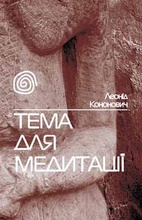 Leonid Kononovych’s Tema dlya medytatsii (Theme for Meditation) has become the biggest sensation in its genre — that of psychological fiction. This is a rare case when professional critics and «unprofessional» readers agree, since the novel is both flawless technically and able of tugging at one’s heartstrings. Set against a broad historical canvas, the plot involves its principal character’s reminiscences about dramatic moments of his own life and tragic lives of his friends, kinfolk and village-folks that survived — or didn’t survive — the Holodomor (Great Famine of 1930-s) and other «socio-political experiments on human beings». We see the man coming back into his native village to shed light upon certain events from his past and decide who he is in the end — a winner or a victim. Physical proximity of places belonging to his past makes the main character slip into some kind of mystical visions, though it does not prevent him from turning into an action hero in a manner of hardball novel personage when situation demands. Leonid Kononovych (born 1958) has several «purebred» crime novels under his belt. Also he is one of the top translators from French into Ukrainian; certain works by Albert Camus, Jean Baudrillard, and Maurice Blanchot were published in his translations. Surely this experience had an impact on his writing style. Kononovych is capable of thrilling his readers and making them feel as participants of described events. At the same time he leaves enough room to diagnose the cases of humanity in terms of philosophy, inviting his readers to decide about their own opinions on the age and their place in it. Tema dlya medytatsii has a lot in common with other Kononovych’s significant works, such as Povernrnnya (Return), Zymova kazka (Winter Tale) and essay Derevo (The Tree). The moods and themes of these are interrelated; what differs is the angle taken by the author to describe one and the same subject — the Ukrainian national character (just like Hokusai’s Thirty-six Views of Mount Fuji are different).
Leonid Kononovych’s Tema dlya medytatsii (Theme for Meditation) has become the biggest sensation in its genre — that of psychological fiction. This is a rare case when professional critics and «unprofessional» readers agree, since the novel is both flawless technically and able of tugging at one’s heartstrings. Set against a broad historical canvas, the plot involves its principal character’s reminiscences about dramatic moments of his own life and tragic lives of his friends, kinfolk and village-folks that survived — or didn’t survive — the Holodomor (Great Famine of 1930-s) and other «socio-political experiments on human beings». We see the man coming back into his native village to shed light upon certain events from his past and decide who he is in the end — a winner or a victim. Physical proximity of places belonging to his past makes the main character slip into some kind of mystical visions, though it does not prevent him from turning into an action hero in a manner of hardball novel personage when situation demands. Leonid Kononovych (born 1958) has several «purebred» crime novels under his belt. Also he is one of the top translators from French into Ukrainian; certain works by Albert Camus, Jean Baudrillard, and Maurice Blanchot were published in his translations. Surely this experience had an impact on his writing style. Kononovych is capable of thrilling his readers and making them feel as participants of described events. At the same time he leaves enough room to diagnose the cases of humanity in terms of philosophy, inviting his readers to decide about their own opinions on the age and their place in it. Tema dlya medytatsii has a lot in common with other Kononovych’s significant works, such as Povernrnnya (Return), Zymova kazka (Winter Tale) and essay Derevo (The Tree). The moods and themes of these are interrelated; what differs is the angle taken by the author to describe one and the same subject — the Ukrainian national character (just like Hokusai’s Thirty-six Views of Mount Fuji are different).
The Ukrainian mindset is described in mass culture as being rather materialistic, and «knowing beans» is really an essential part of it — but at the same time the worldview of an Ukrainian person is deeply and hopelessly mystic. For instance, Nikolai Gogol’s characters generally show the same purely Ukrainian psychology, as their author did, too.
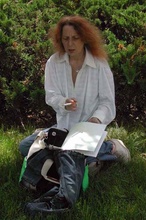 The most influential author in contemporary Ukrainian mystic fiction is Halyna Pahutyak (born 1958). She lives in Lviv, a city where every brick and every cobble speaks of the Middle Ages. Ms Halyna’s most popular books are Smitnyk Hospoda nashoho (Rubbish Dump of Our Lord), Radisna pustelya (A Joyful Wasteland), Pysar Shidnyh Vorit Prytulku (The Clerk of Shelter’s East Gates), Korolivstvo (The Kingdom), Zahid sontsya v Urozhi (Sunset in Urizh), and Sluha z Dobromylya (The Servant from Dobromyl). Ukrainian mystic fiction is essentially different from fantasy fiction descending from the British and American tradition. Halyna Pahutyak’s designs and themes generally have their roots in the Central European tradition. However, they are unlike many authors’ novels about Vlad III Prince of Wallachia (also known as Dracula), where valiant vampire-hunters punish the sinister undead for their horrible crimes, and where it is not the plot that makes the difference but rather the way of telling the story — stale (giving the reader a possibility to blame author for banality) or original (leaving the reader satisfied). One reads Halyna Pahutyak’s books is if they were real folk legends and myths of a land where neither party had ever gained a long-lasting victory even locally, recorded (and not invented) by a professional author. In this land the time itself flows in several opposing streams. Pahutyak’s authentically West Ukrainian Gothic novels are mystic epics with complicated plots and a variety of rivaling characters of equal importance. As a true myth-maker, she is fond of leaving possibilities and questions open in the end, this flexibility of plots and styles being an essential part of her writing’s charm. Halyna Pahutyak’s fiction can make a perfectly elegant mystery thriller film.
The most influential author in contemporary Ukrainian mystic fiction is Halyna Pahutyak (born 1958). She lives in Lviv, a city where every brick and every cobble speaks of the Middle Ages. Ms Halyna’s most popular books are Smitnyk Hospoda nashoho (Rubbish Dump of Our Lord), Radisna pustelya (A Joyful Wasteland), Pysar Shidnyh Vorit Prytulku (The Clerk of Shelter’s East Gates), Korolivstvo (The Kingdom), Zahid sontsya v Urozhi (Sunset in Urizh), and Sluha z Dobromylya (The Servant from Dobromyl). Ukrainian mystic fiction is essentially different from fantasy fiction descending from the British and American tradition. Halyna Pahutyak’s designs and themes generally have their roots in the Central European tradition. However, they are unlike many authors’ novels about Vlad III Prince of Wallachia (also known as Dracula), where valiant vampire-hunters punish the sinister undead for their horrible crimes, and where it is not the plot that makes the difference but rather the way of telling the story — stale (giving the reader a possibility to blame author for banality) or original (leaving the reader satisfied). One reads Halyna Pahutyak’s books is if they were real folk legends and myths of a land where neither party had ever gained a long-lasting victory even locally, recorded (and not invented) by a professional author. In this land the time itself flows in several opposing streams. Pahutyak’s authentically West Ukrainian Gothic novels are mystic epics with complicated plots and a variety of rivaling characters of equal importance. As a true myth-maker, she is fond of leaving possibilities and questions open in the end, this flexibility of plots and styles being an essential part of her writing’s charm. Halyna Pahutyak’s fiction can make a perfectly elegant mystery thriller film.
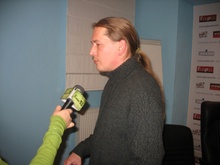 Prose by Mychaylo Brynykh (born 1974) has nothing to do with romance. Though his debut novel Realna nizhnist vyrvanoho sertsya (Real Affection of A Heart Torn Out) demonstrates most refine maneuvering between three classical elements of fable literature — he, she and a secret society — it is rather a burlesque version of a typical horror novel. Recently Brynykh has published two more novels on end. Elektronny plastylin (Digital Clay) is a story where living people become dead, or pretend so. Rather small book features 26 deaths, and the author’s philosophy is contained in the following quotation from the novel: ‘You’d love living one more life if you get such possibility. The number of reincarnations is unlimited. The only problem is that you may think you’re using the clay to make a perfect existence. But you know nothing of the way in which the clay views your relationships with it’. The newest Brynykh’s novel entitled Shakhmaty dlya dybiliv (Chess for Morons) is a story of a man bringing up an adolescent chess-player. The book is packed with fresh ideas and experiments in language and culture. At the same time it is a history of the game of chess with a host of facts and innuendos. Brynykh’s narration is full of unexpected twists and ironical maxims, keeping the reader eager to learn what’s next and thus turning pages. But what is especially delightful is the author’s unique sarcasm. Brynykh is really fond of mocking today’s postmodern life using vividly postmodernist tips.
Prose by Mychaylo Brynykh (born 1974) has nothing to do with romance. Though his debut novel Realna nizhnist vyrvanoho sertsya (Real Affection of A Heart Torn Out) demonstrates most refine maneuvering between three classical elements of fable literature — he, she and a secret society — it is rather a burlesque version of a typical horror novel. Recently Brynykh has published two more novels on end. Elektronny plastylin (Digital Clay) is a story where living people become dead, or pretend so. Rather small book features 26 deaths, and the author’s philosophy is contained in the following quotation from the novel: ‘You’d love living one more life if you get such possibility. The number of reincarnations is unlimited. The only problem is that you may think you’re using the clay to make a perfect existence. But you know nothing of the way in which the clay views your relationships with it’. The newest Brynykh’s novel entitled Shakhmaty dlya dybiliv (Chess for Morons) is a story of a man bringing up an adolescent chess-player. The book is packed with fresh ideas and experiments in language and culture. At the same time it is a history of the game of chess with a host of facts and innuendos. Brynykh’s narration is full of unexpected twists and ironical maxims, keeping the reader eager to learn what’s next and thus turning pages. But what is especially delightful is the author’s unique sarcasm. Brynykh is really fond of mocking today’s postmodern life using vividly postmodernist tips.
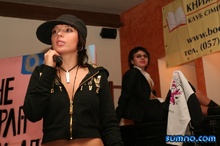 Rather specific narrative-confessional style that’s of popular writer and musician Irena Karpa (1980). Every Karpa’s book is a shocking cocktail mixed from true biography fragments and imagined adventures of the author who really has a lot to tell about her inward as well as of the wide world that she explores unstoppably globe-trotting. Irena translates her impressions from various nations and ones she gained from her jobs with fashion and show-biz, in editorials of glossy magazines and on TV and her rock star experiences with her band «Qarpa» into acid, stranded of erotic and dramatic and comical yarns prose. Her books Znes Palenogo (Paleny Wrecker), Freud by plakav (Freud Would Cry), Pyatdesiat hwylyn trawy (50 Minutes Of Grass), Supermarket samotnosty. Perlamutrowe porno (Supermarket of Loneliness. Pearl Porno),Bitches Get EverythingandDoblo іZlo (The Goot And The Bad)are favourite reading for teenagers and those of grownups who are eager to know what’d tell them their own children if they dared to.
Rather specific narrative-confessional style that’s of popular writer and musician Irena Karpa (1980). Every Karpa’s book is a shocking cocktail mixed from true biography fragments and imagined adventures of the author who really has a lot to tell about her inward as well as of the wide world that she explores unstoppably globe-trotting. Irena translates her impressions from various nations and ones she gained from her jobs with fashion and show-biz, in editorials of glossy magazines and on TV and her rock star experiences with her band «Qarpa» into acid, stranded of erotic and dramatic and comical yarns prose. Her books Znes Palenogo (Paleny Wrecker), Freud by plakav (Freud Would Cry), Pyatdesiat hwylyn trawy (50 Minutes Of Grass), Supermarket samotnosty. Perlamutrowe porno (Supermarket of Loneliness. Pearl Porno),Bitches Get EverythingandDoblo іZlo (The Goot And The Bad)are favourite reading for teenagers and those of grownups who are eager to know what’d tell them their own children if they dared to.
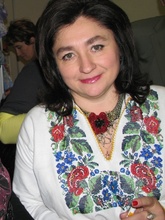 There is an author in Ukraine who is jokingly named George Maria Matios Sand. Maria Matios (born 1959) is one of the most exuberant novelists in contemporary Ukrainian literature. She regularly publishes high-quality texts in which both characters and backdrops they act against are highly elaborate. And the characters act against broad historical canvas (Natsia\Nation and Moskalytsya). Matios’s novels are also often set in times of deathly peril and moments crucial for the Ukrainian nation — during the Second World War and struggle for independence of Ukraine (Schodennyk strachenoyi\Diary of the Executed and Solodka Darusya\Sweet Darusia) — and in the modern time (Bulvarny roman\Shilling Shocker). Maria Matios’s main characters are as a rule female, and the cruelty of their existence is described in a very realistic manner. But whether a heroine is an underground resistance connects, someone’s lover or a business lady, she always retains her femininity. A number of Maria Matios’s books have been adapted for theatre and have been successful, with spectators bursting into grateful tears during performances.
There is an author in Ukraine who is jokingly named George Maria Matios Sand. Maria Matios (born 1959) is one of the most exuberant novelists in contemporary Ukrainian literature. She regularly publishes high-quality texts in which both characters and backdrops they act against are highly elaborate. And the characters act against broad historical canvas (Natsia\Nation and Moskalytsya). Matios’s novels are also often set in times of deathly peril and moments crucial for the Ukrainian nation — during the Second World War and struggle for independence of Ukraine (Schodennyk strachenoyi\Diary of the Executed and Solodka Darusya\Sweet Darusia) — and in the modern time (Bulvarny roman\Shilling Shocker). Maria Matios’s main characters are as a rule female, and the cruelty of their existence is described in a very realistic manner. But whether a heroine is an underground resistance connects, someone’s lover or a business lady, she always retains her femininity. A number of Maria Matios’s books have been adapted for theatre and have been successful, with spectators bursting into grateful tears during performances.
If «harlequin novels» have been mentioned, Halyna Vdovychenko (born 1959) should be named as a rising star of the genre. Her debut novel Piv’yabluka (Half an Apple) about four women and a magic apple has been kindly reviewed in the papers.
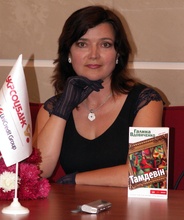 Nevertheless, the real queen of the genre is Iren Rozdobud’ko (born 1962). Her erotic detective novels bear expressive titles: Pastka dlya Zhar-ptyrsi (A Trap for the Firebird), Gudzyk (A Button), Vin: Rankovy prybyralnyk. Vona: Shosti dveri (He: The Morning Cleaner. She: The Sixths Door), Dvanatsyat, abo vykhovannya zhinky v umovakh, neprydatnykh dlya zhytya (Twelve, or Educating a Woman in Unlivable Conditions), Ziv’yali kvity vykydayut (Faded Flowers are Thrown Away), Ostanny diamant miledi (Milady’s Last Diamond), Amulet Paskalya (Pascal’s Amulet), Eskort u smert (Escort to Death), Pereformuluyvanya (Re-phrasing), Dvi hvylyny pravdy (Two minutes of Truth), and Vse, scho ya khotila syohodni (Everything I Wanted Today). Currently Rozbobudko mainly adapts her novels for films. In 2008 a TV film Gudzyk after the novel of the same name was released, two more books are currently being filmed.
Nevertheless, the real queen of the genre is Iren Rozdobud’ko (born 1962). Her erotic detective novels bear expressive titles: Pastka dlya Zhar-ptyrsi (A Trap for the Firebird), Gudzyk (A Button), Vin: Rankovy prybyralnyk. Vona: Shosti dveri (He: The Morning Cleaner. She: The Sixths Door), Dvanatsyat, abo vykhovannya zhinky v umovakh, neprydatnykh dlya zhytya (Twelve, or Educating a Woman in Unlivable Conditions), Ziv’yali kvity vykydayut (Faded Flowers are Thrown Away), Ostanny diamant miledi (Milady’s Last Diamond), Amulet Paskalya (Pascal’s Amulet), Eskort u smert (Escort to Death), Pereformuluyvanya (Re-phrasing), Dvi hvylyny pravdy (Two minutes of Truth), and Vse, scho ya khotila syohodni (Everything I Wanted Today). Currently Rozbobudko mainly adapts her novels for films. In 2008 a TV film Gudzyk after the novel of the same name was released, two more books are currently being filmed.
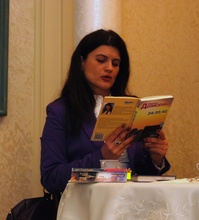 Action «harlequin novels» by a lawyer, show presenter and writer Larysa Denysenko, born 1973 (Zabavky z ploti ta krovi\Toys Made of Flesh and Blood, Kavovy prysmak korytsi\Cinnamon’s Coffee Taste, Tantsi v maskakh\Dancing Masked, Korporatsia Idiotiv\Idiot Corporation, and 24:33:42), also have their devoted fans and reprint regularly.
Action «harlequin novels» by a lawyer, show presenter and writer Larysa Denysenko, born 1973 (Zabavky z ploti ta krovi\Toys Made of Flesh and Blood, Kavovy prysmak korytsi\Cinnamon’s Coffee Taste, Tantsi v maskakh\Dancing Masked, Korporatsia Idiotiv\Idiot Corporation, and 24:33:42), also have their devoted fans and reprint regularly.
But the garland of the most psychological author of the genre should go to Yevgenija Kononenko (born 1959). Her highly detailed in terms of realism books like Imitatsia (Imitation), Betrayal. ZRADA made in Ukraine, Nostalgia, Bez muzhyka (No Man’s Woman), Poviyi tezh vykhodyat zamizh (Prostitutes Also Marry), and Novely dlya nezilovanyh divchat (Stories for Unkissed Girls) seem to be of use even for generations of readers to come, if they would like to learn of everyday life and feelings of strong Ukrainian women (and men clinging to them) on the brink of the millennia. Granting the reader a possibility to make allegiance with the character is one of essential features of good fiction, and Yevgenija Kononenko’s writing gives us such chance.
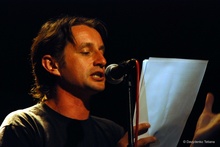 Some authors in Ukraine have gained positions of ethic teachers alike to that of spiritual gurus or ideologically influential rock stars in ‘60s. Their public readings attract those who wish to communicate with «real literature». An author with this kind of influence is Serhiy Zhadan (born 1974). Dwelling in the East of Ukraine, he impregnates minds of his devoted readers with both poetry and prose. Every new Zhadan’s book inevitably turns out to be a national bestseller. He is especially popular among young readers, as his writing truthfully, sarcastically and yet poetically recreates aesthetical values of those ‘slacker’ girls and boys that have consciously chosen to live, work, play, feel happy or feel miserable on the mainstream’s margins. The author himself has once downshifted, giving up lecturing in European and Ukrainian literature in the University of Kharkiv to hitchhike and trekking around Europe, this experience certainly granting him some right to throw his heroes in the midst of goings-on that seem at least ambiguous from the point of view of traditional morals and sometimes law (though Zhadan would eagerly help them out of the trouble, not really safe but quite sound). Zhadan’s most popular books are Big Mac, Depeche Mode, Anarchy in the UKR, and Hymn demokratychnoi molodi (The Hymn of Democratic Youth).
Some authors in Ukraine have gained positions of ethic teachers alike to that of spiritual gurus or ideologically influential rock stars in ‘60s. Their public readings attract those who wish to communicate with «real literature». An author with this kind of influence is Serhiy Zhadan (born 1974). Dwelling in the East of Ukraine, he impregnates minds of his devoted readers with both poetry and prose. Every new Zhadan’s book inevitably turns out to be a national bestseller. He is especially popular among young readers, as his writing truthfully, sarcastically and yet poetically recreates aesthetical values of those ‘slacker’ girls and boys that have consciously chosen to live, work, play, feel happy or feel miserable on the mainstream’s margins. The author himself has once downshifted, giving up lecturing in European and Ukrainian literature in the University of Kharkiv to hitchhike and trekking around Europe, this experience certainly granting him some right to throw his heroes in the midst of goings-on that seem at least ambiguous from the point of view of traditional morals and sometimes law (though Zhadan would eagerly help them out of the trouble, not really safe but quite sound). Zhadan’s most popular books are Big Mac, Depeche Mode, Anarchy in the UKR, and Hymn demokratychnoi molodi (The Hymn of Democratic Youth).
Life in the East of Ukraine seen from a different angle features in Klyasa (The Class) by Pavlo Volvach (born 1963). The story is set in Zaporizhia (‘the Manchester of Ukraine’). Historically the area has been known as a center of liberation ideas and military struggle for independence. There the Cossak republic Zaporozhian Sich thrived in the 16th and 17th centuries; in 1918-21 vast area there was ruled by the Insurgent Army of Nestor Makhno, a mighty military movement of Ukrainian farmers against both capitalism and Communism… No wonder that Klyasa — a chronicle of a young poet born in industrial suburbia and getting into dangerous adventures with his lumpen and criminal friends — is soaked with the spirit of anarchism.
In a thousand of kilometers from Kharkiv and Zaporizhia, in the city of Chernivtsi not far from Ukraine’s western borders, Vasyl’ Kozheljanko(1957-2008) lived and wrote. His books Defiliada v Moskvi (Military Parade in Moscow), Konotop, Ludynets pana Boha (Mister God’s Wild Men Show), Lzhe-Nostradamus (False Nostradamus), Kotyhoroshko, Terrorium, and Sribniy pavuk (Silver Spider) generally feature adventures of fictional and historical characters against «alternative history» backdrops. Development of the real Ukraine didn’t follow the way «indicated» by Kozheljanko. But it definitely will not prevent films and computer games based on his books from being produced.
Volodymyr Lys (born 1951), an author from the city of Lutsk, is a journalist, playwright, and novelist. Volodymyr Lys has had his debut in literature as a playwright, and five his plays have been staged in theatres and broadcasted as radio shows. His career as a novelist started later, when publishing houses in Kyiv, Lviv and Ternopil has printed his novels Aistry na zubri (Asters on Auroch), Romana, Maska\Lyudyna v p’yatyokh maskakh (Mask\A Man in Five Masks), Prodavets doli (Fortune-seller) etc. Unusual characters in unusual conditions combined with complex psychological issues and a masterful mixture of reality and illusion make Lys’s novels perfectly readable, magically compelling and able to satisfy most sophisticated tastes in literature.
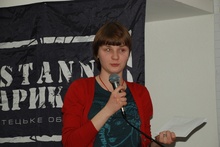 For reasons unknown, most Ukrainian authors of the younger generation are female. The most flamboyant debutant of the recent years has become Kseniya Kharchenko (born 1984), Even if she wouldn’t write any new books after her debut novel Istoria (A Story), she has already left her mark in history of Ukrainian literature. Her text, clear and intoxicating like morning air of a spring yet unspoiled by industrial revolution, has been enthusiastically met by readers and favourably commented by critics, but severely criticized by Christian moral crusaders. What was the reason? The phantasmagorical story of a girl named Hlykera is easy to read as paganistically real. The girl was carried to term and born from her granddad’s underarm; she came into this world already adult and able to write, as she ‘was bound to’ write down the story of her kin. Hlykera knows everything about her mother, father, grandmother and all the great-grands. She has a long tail, hooves, beautiful fur covering her body, and a braid that behind her back entwines with her tail lovingly…
For reasons unknown, most Ukrainian authors of the younger generation are female. The most flamboyant debutant of the recent years has become Kseniya Kharchenko (born 1984), Even if she wouldn’t write any new books after her debut novel Istoria (A Story), she has already left her mark in history of Ukrainian literature. Her text, clear and intoxicating like morning air of a spring yet unspoiled by industrial revolution, has been enthusiastically met by readers and favourably commented by critics, but severely criticized by Christian moral crusaders. What was the reason? The phantasmagorical story of a girl named Hlykera is easy to read as paganistically real. The girl was carried to term and born from her granddad’s underarm; she came into this world already adult and able to write, as she ‘was bound to’ write down the story of her kin. Hlykera knows everything about her mother, father, grandmother and all the great-grands. She has a long tail, hooves, beautiful fur covering her body, and a braid that behind her back entwines with her tail lovingly…
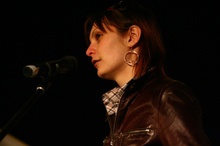 Another young author Tetjana Vynokurova-Sadychenko (born 1984) embodies all the finest things of young age. Her books Zhart. Iz zhytya psyhiv\A Joke. From the Life of Loonies, Zhart druhyi. Kvit paporoti\The Joke Number Two. Fern-Blossom, MY\WE, and Ilyuzia\The Illusion) make easy reading and easy listening, as good adventure fiction should. There’s love (can a novel be without it?); magic of folkloristic origin (that’s why it looks so real); and a good deal of philosophy and what is jokingly called woman’s reason. This wonderful mix is generously seasoned with irony and humoristic self-deprecation, and you can’t help but help yourself to this savoury meal. Tetjana’s themes range from naked truth of Ukraine’s today to legends combining traditional myths and modern youth’s tales. Thus,Zhart druhyi. Kvit paporoti is a contemporary remake of old legends of the quest for the magic fern-blossom. MY is based on real stories from lives of the author’s friends, though as ever Tetjana Vynokurova-Sadychenko adds a hint of magic.
Another young author Tetjana Vynokurova-Sadychenko (born 1984) embodies all the finest things of young age. Her books Zhart. Iz zhytya psyhiv\A Joke. From the Life of Loonies, Zhart druhyi. Kvit paporoti\The Joke Number Two. Fern-Blossom, MY\WE, and Ilyuzia\The Illusion) make easy reading and easy listening, as good adventure fiction should. There’s love (can a novel be without it?); magic of folkloristic origin (that’s why it looks so real); and a good deal of philosophy and what is jokingly called woman’s reason. This wonderful mix is generously seasoned with irony and humoristic self-deprecation, and you can’t help but help yourself to this savoury meal. Tetjana’s themes range from naked truth of Ukraine’s today to legends combining traditional myths and modern youth’s tales. Thus,Zhart druhyi. Kvit paporoti is a contemporary remake of old legends of the quest for the magic fern-blossom. MY is based on real stories from lives of the author’s friends, though as ever Tetjana Vynokurova-Sadychenko adds a hint of magic.
- **
In Ukraine translations from other tongues since the days of yore have abounded, but translations from the Ukrainian language is only starting to appear. No wonder here.
To begin with, non-native speakers of Ukrainian are scarce in the world.
Then, where such people are, they often don’t keep in touch with processes constantly taking place in Ukrainian literature (and such processes often bring rapid and dramatic changes).
And, certainly, it takes time for other nations to get used to those (specifically Ukrainian) culture codes that are known to be used by each and every culture to manifest its existence.
Though even right now it seems perfectly possible for some books by modern Ukrainian authors to become global bestsellers — just quality translations and smart marketing policies of publishers are wanted.
